Abstract
Studies of somatic tissues and cultured cells, including fibroblast clones, from human embryos heterozygous for the electrophoretic variants of glucose-6-phosphate dehydrogenase confirm that one X chromosome is inactivated very early in embryonic development and indicate that X inactivation has occurred in the majority of cells from a variety of tissues at least by 5 weeks from conception.
Full text
PDF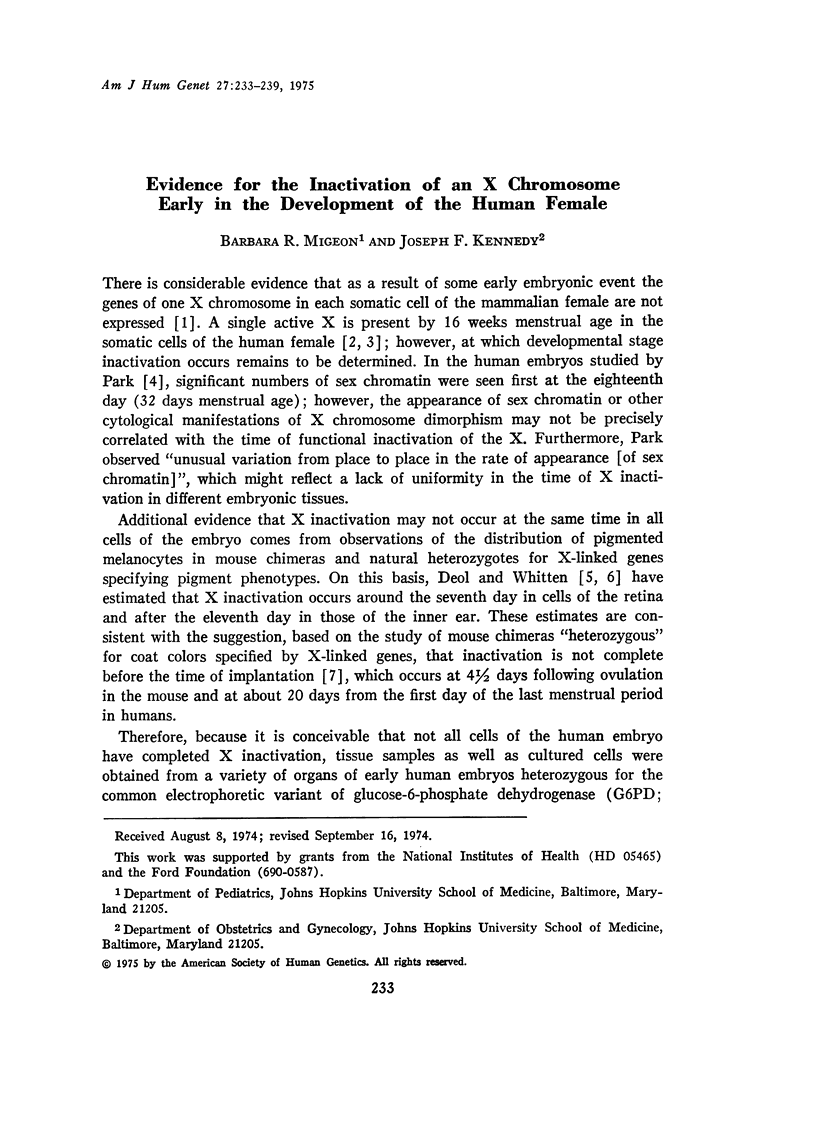

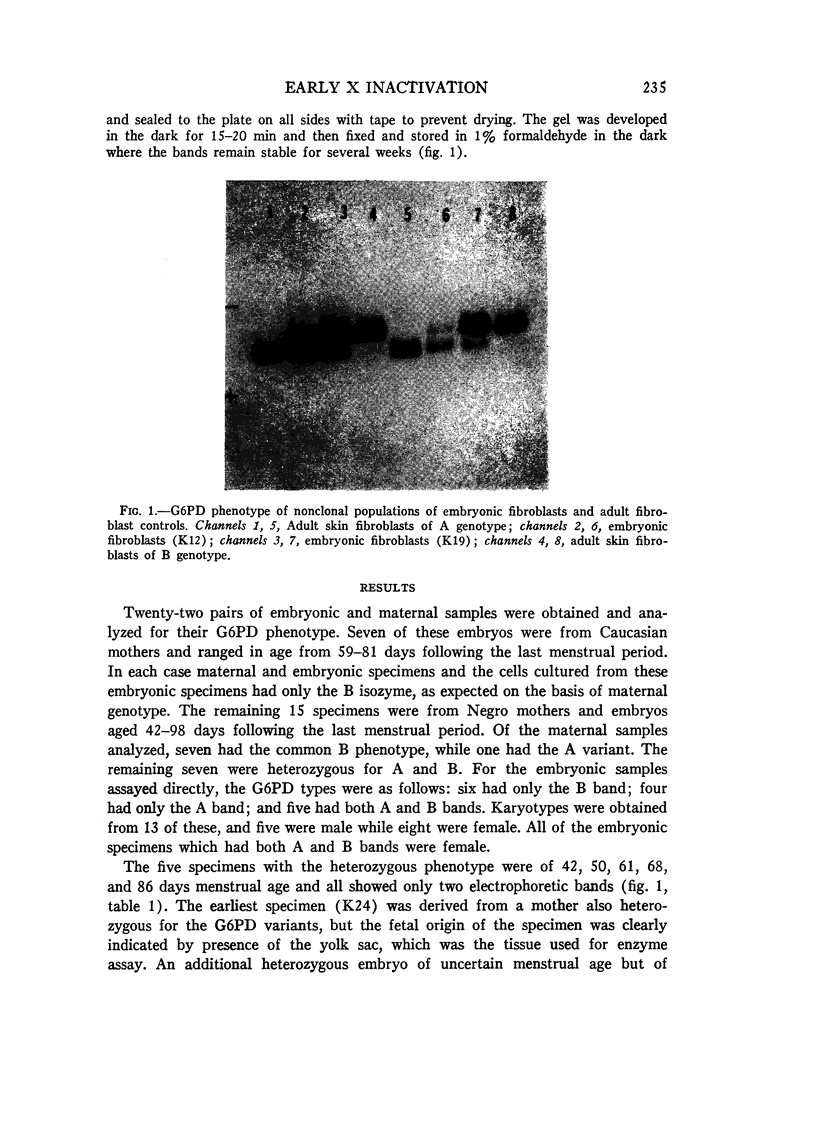
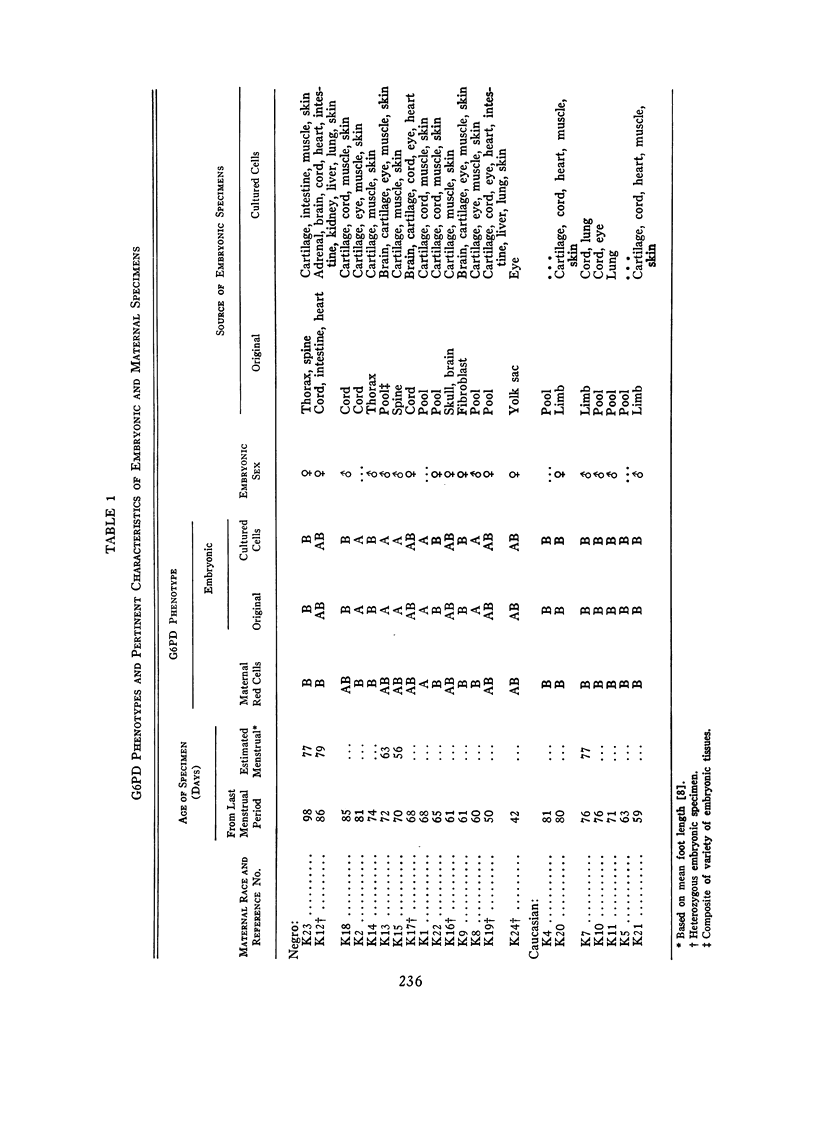
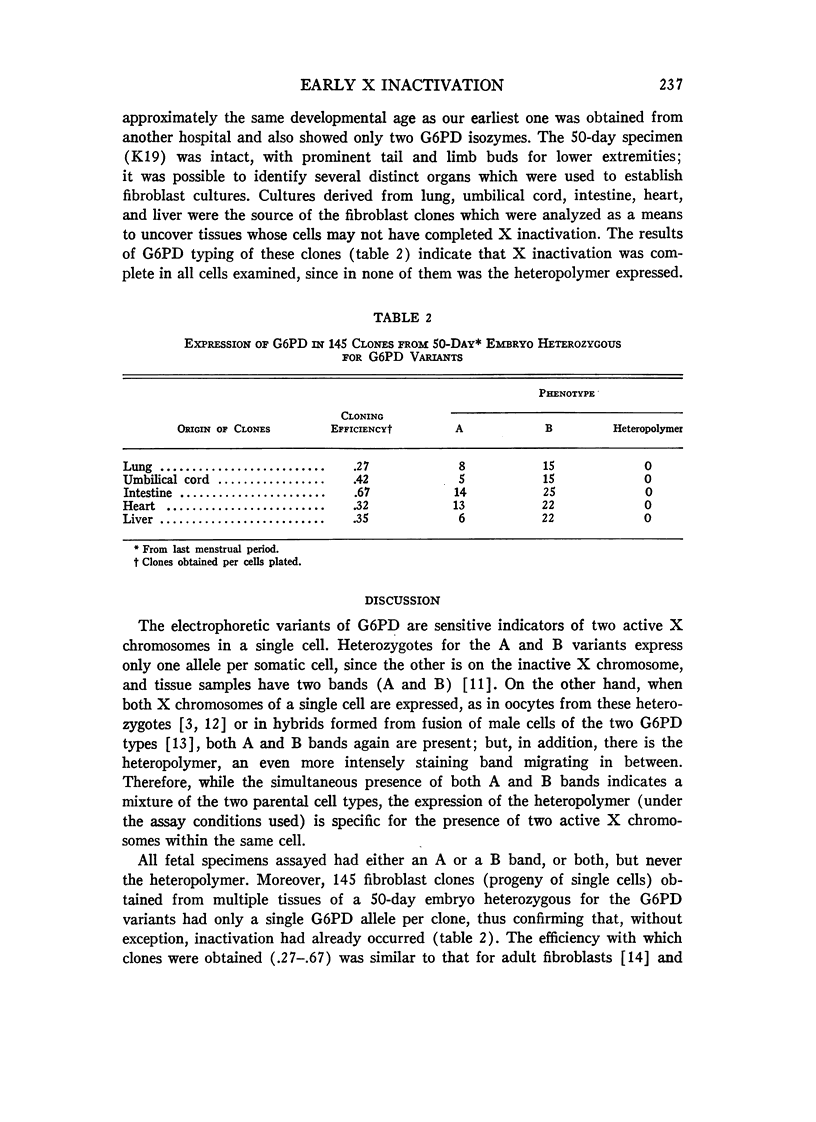
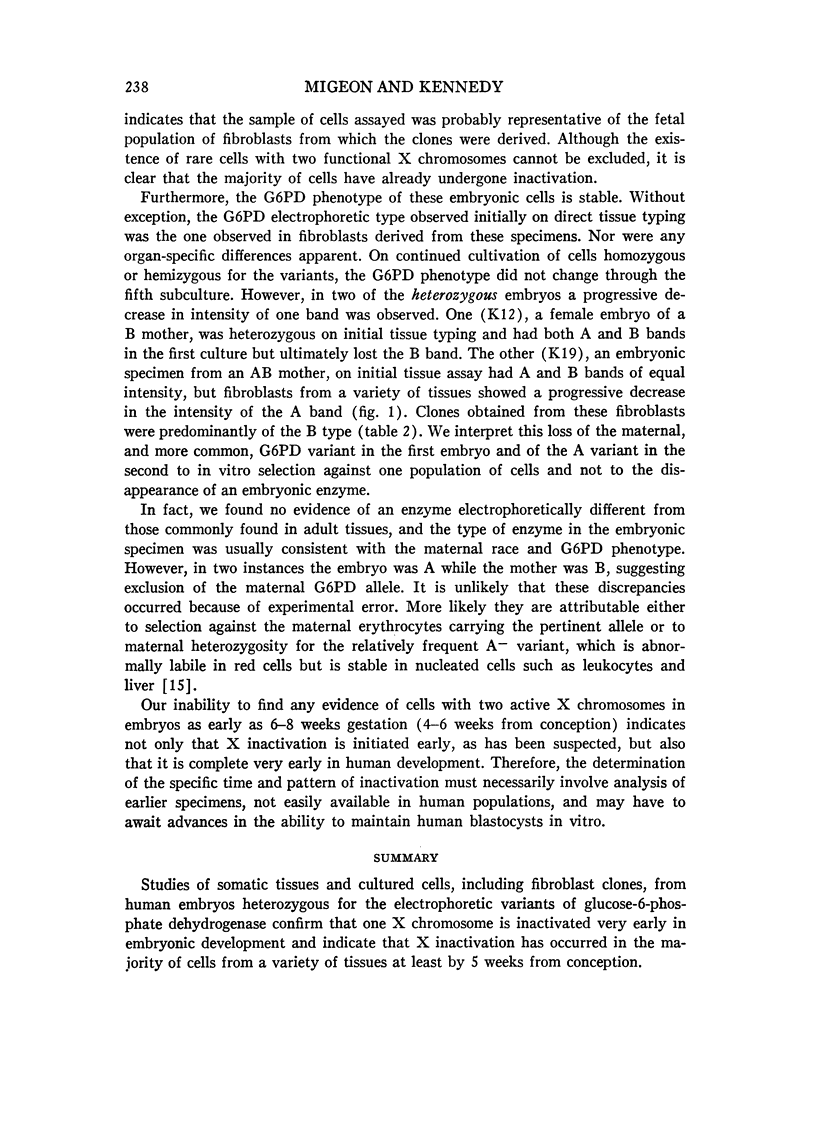
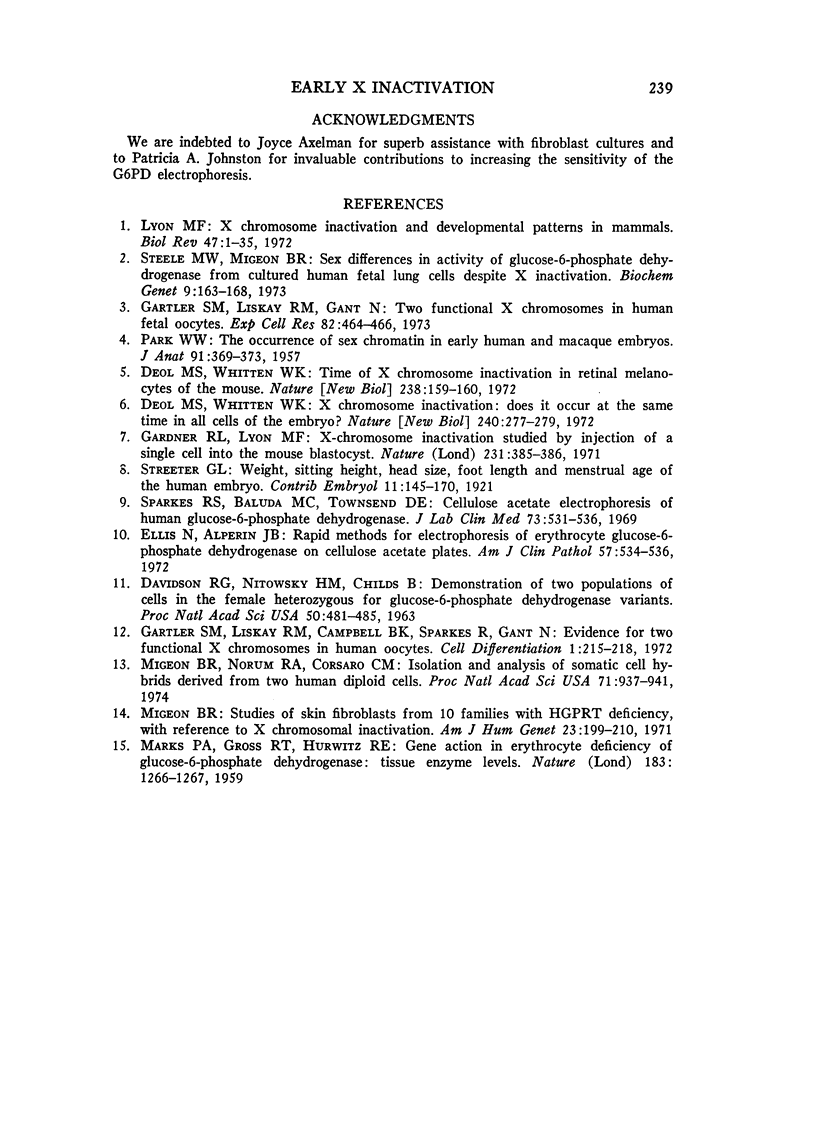
Images in this article
Selected References
These references are in PubMed. This may not be the complete list of references from this article.
- DAVIDSON R. G., NITOWSKY H. M., CHILDS B. DEMONSTRATION OF TWO POPULATIONS OF CELLS IN THE HUMAN FEMALE HETEROZYGOUS FOR GLUCOSE-6-PHOSPHATE DEHYDROGENASE VARIANTS. Proc Natl Acad Sci U S A. 1963 Sep;50:481–485. doi: 10.1073/pnas.50.3.481. [DOI] [PMC free article] [PubMed] [Google Scholar]
- Deol M. S., Whitten W. K. Time of X chromosome inactivation in retinal melanocytes of the mouse. Nat New Biol. 1972 Aug 2;238(83):159–160. doi: 10.1038/newbio238159a0. [DOI] [PubMed] [Google Scholar]
- Deol M. S., Whitten W. K. X-chromosome inactivation: does it occur at the same time in all cells of the embryo? Nat New Biol. 1972 Dec 27;240(104):277–279. doi: 10.1038/newbio240277a0. [DOI] [PubMed] [Google Scholar]
- Ellis N., Alperin J. B. Laboratory suggestions: a rapid method for electrophoresis of erythrocyte glucose-6-phosphate dehydrogenase on cellulose acetate plates. Am J Clin Pathol. 1972 Apr;57(4):534–536. doi: 10.1093/ajcp/57.4.534. [DOI] [PubMed] [Google Scholar]
- Gardner R. L., Lyon M. F. X chromosome inactivation studied by injection of a single cell into the mouse blastocyst. Nature. 1971 Jun 11;231(5302):385–386. doi: 10.1038/231385a0. [DOI] [PubMed] [Google Scholar]
- Gartler S. M., Liskay R. M., Campbell B. K., Sparkes R., Gant N. Evidence for two functional X chromosomes in human oocytes. Cell Differ. 1972 Oct;1(4):215–218. doi: 10.1016/0045-6039(72)90039-5. [DOI] [PubMed] [Google Scholar]
- Gartler S. M., Liskay R. M., Gant N. Two functional X chromosomes in human fetal oocytes. Exp Cell Res. 1973 Dec;82(2):464–466. doi: 10.1016/0014-4827(73)90368-6. [DOI] [PubMed] [Google Scholar]
- Lyon M. F. X-chromosome inactivation and developmental patterns in mammals. Biol Rev Camb Philos Soc. 1972 Jan;47(1):1–35. doi: 10.1111/j.1469-185x.1972.tb00969.x. [DOI] [PubMed] [Google Scholar]
- MARKS P. A., GROSS R. T., HURWITZ R. E. Gene action in erythrocyte deficiency of glucose-6-phosphate dehydrogenase: tissue enzyme-levels. Nature. 1959 May 2;183(4670):1266–1267. doi: 10.1038/1831266b0. [DOI] [PubMed] [Google Scholar]
- Migeon B. R., Norum R. A., Corsaro C. M. Isolation and analysis of somatic hybrids derived from two human diploid cells. Proc Natl Acad Sci U S A. 1974 Mar;71(3):937–941. doi: 10.1073/pnas.71.3.937. [DOI] [PMC free article] [PubMed] [Google Scholar]
- Migeon B. R. Studies of skin fibroblasts from 10 families with HGPRT deficiency, with reference in X-chromosomal inactivation. Am J Hum Genet. 1971 Mar;23(2):199–210. [PMC free article] [PubMed] [Google Scholar]
- PARK W. W. The occurrence of sex chromatin in early human and macaque embryos. J Anat. 1957 Jul;91(3):369–373. [PMC free article] [PubMed] [Google Scholar]
- Sparkes R. S., Baluda M. C., Townsend D. E. Cellulose acetate electrophoresis of human glucose-6-phosphate dehydrogenase. J Lab Clin Med. 1969 Mar;73(3):531–534. [PubMed] [Google Scholar]
- Steele M. W., Migeon B. R. Sex differences in activity of glucose 6-phosphate dehydrogenase from cultured human fetal lung cells despite X-inactivation. Biochem Genet. 1973 Jun;9(2):163–168. doi: 10.1007/BF00487445. [DOI] [PubMed] [Google Scholar]



